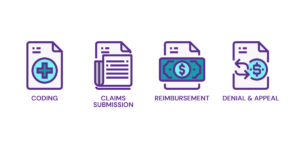Blog

Table of Contents
Ambulatory surgery and ambulatory surgical centers (ASCs) are on the rise these days. When it comes to billing through ASCs, there are a few things that both you and your billing team need to be aware of before submitting claims for services. Payers can vary in terms of their acceptance of medical necessity, accepted procedures, and other filing criteria. For those new to filing claims for ASC services, having a good understanding of the process beforehand can help to ensure faster and more complete reimbursements. For even experienced billers, the ever-evolving nature of payers makes it difficult to stay updated on changes without the assistance of claims management services from external entities.
Continue reading to learn more about ambulatory surgery billing, including the medical billing process and the many benefits of outsourcing ambulatory billing.
What is Ambulatory Surgery?
Ambulatory surgery, which is also termed “outpatient surgery” or “same-day surgery”, is a kind of surgical procedure undertaken in a medical center or hospital, yet not need an overnight stay. Patients who receive ambulatory surgery normally arrive at the facility for the operation on the day of the procedure and then depart home afterward. Some of the surgical processes that can be done on an outpatient basis include cataract surgery, colonoscopy, arthroscopy, endoscopy, and numerous kinds of hernia repairs.
Advantages of ambulatory surgery include reduced recuperation periods, lower expenses, and the capacity for patients to come back to their usual behaviors more rapidly. As patients are not required to remain in a hospital for the night, they are also less vulnerable to infection. However, not all surgical operations can be completed on a day-patient basis. Some surgeries, such as major organ procedures or those that require lengthy post-operative healing and surveillance, may necessitate an in-hospital stay.
What is Ambulatory Billing?
Ambulatory billing is a crucial part of any outpatient healthcare facility. It involves submitting claims to insurance companies and collecting reimbursements for procedures or services performed in the ASC or doctor’s office. The process can be complicated and time-consuming, as there are many steps involved in properly submitting claims for ambulatory billing. It is important to ensure that all claims are accurate and include all the necessary information so that there is no delay in receiving reimbursement.
Proper knowledge of ambulatory billing processes is essential for the efficient functioning of any outpatient healthcare facility. The following are components of the ambulatory billing process:

Coding
The coding of ambulatory billing is extremely important as it determines the sum of money one is going to be reimbursed and makes sure that all regulatory standards are being met. This process necessitates the utilization of International Classification of Diseases (ICD) and Current Procedural Terminology (CPT) codes to precisely delineate the diagnoses and procedures done on the patient.
Claims Submission
Claim submission is an important step in the electronic billing process. It is essential to ensure that the claims have all the necessary details and are in compliance with the applicable standards. The claims should contain all of the patient data, as well as the correct diagnosis and procedure codes for services rendered and the associated charges. Accurate claim submission is paramount to ensure timely and accurate payments for services provided.
Reimbursement
The payer will assess the accuracy of the claim and either approve or deny the request for reimbursement. This is an important step in the process since it will determine whether the provider receives payment for services rendered. It is important to note that reimbursement rates for ASCs are typically lower than those of inpatient or hospital settings. To ensure that providers receive adequate reimbursement, it is essential for them to understand the reimbursement process and work with payers to negotiate favorable rates.
Denial and Appeal
It is important for healthcare personnel to understand the reasons behind a denial, as well as the proper steps for appealing the decision. An appeal should be filed in writing, and any additional information or documentation should be included with the submission. Depending on the payer, there may also be strict deadlines that must be adhered to for successful appeals. It is important to remember that appealing a denial is an option, and providers should take advantage of this opportunity whenever possible.
Ambulatory Surgery Centers Q&A

Tina Wangler
Director of Revenue Cycle
Tina has over a decade of experience in revenue cycle management for healthcare providers, specifically within the hospital and ambulatory surgery space. With extensive knowledge and a keen ability to make sense of the process, Tina was gracious enough to share her insights on how the Hansei team handles the persistent challenges that impact the ASC space.
Let’s learn together, shall we?
Q. If you could change just one thing in the ASC space, what would it be?
A. Easy. Timely and fair reimbursement for providers – specifically for out-of-network. With the industry shifting to push more cases to the ASC setting, we continue to work hard to get adequate reimbursement. There is more scrutiny with out-of-network claims, and many carriers/TPAs will make a low initial payment to turn around and issue a larger payment after the lengthy appeal process.
Q. Documentation has always been an integral piece of the equation. What documentation challenges do ASCs face?
A. This piece is one of the more challenging issues we face. As payers continue to revise their medical and reimbursement policies, ASCs must stay informed and ensure they edit their documentation to meet these requirements. This includes educating providers, creating custom billing/scrubbing rules, editing templates and workflows, and ensuring you have a robust QA process to catch your outliers.
Q. Can you talk about the average billing-to-payment cycle for an ASC?
A. The industry standard is about 35 days, but many ASCs operate out of network, so this can push your days in AR up. We find that medical records requests also contribute to increasing this number, so ensuring you have a quick turnaround time on these requests is key.
Well said, Tina – consider the mic dropped… almost.
In a post-pandemic landscape – we are all faced with higher costs, and the healthcare industry is no exception. Outsourcing RCM operations is a big decision, and many providers think they will lose some control, but Hansei is here to bridge that gap. We have a highly-motivated team who approaches problem-solving with open arms, and we would love to hear how we can help your organization.
What Are The Guidelines For Ambulatory Surgery Center Billing Services?
The Centers for Medicare and Medicaid Services (CMS), a federal agency that oversees Medicare and Medicaid, establishes the regulations for invoicing related to ASC (ambulatory surgical center) services. A list of procedures approved by ASC, along with the reimbursement rate for each one, is published yearly by CMS. These procedures are sorted into three payment categories:
ASC Payment Group A
Procedures that are categorized under ASC Payment Group A are thought to be relatively uncomplicated and are thus reimbursed at a lesser rate compared to other treatments.
ASC Payment Group B
ASC Payment Group B includes treatments that are considered moderately complicated, and thus typically yield a greater remuneration than Group A operations.
ASC Payment Group C
ASC Payment Group C involves methods that are usually regarded as complicated and usually given the highest remuneration among the three payment categories.
When submitting claims for services rendered by an ambulatory surgical center (ASC), it is crucial to make sure that the procedure is listed as an approved one and that the corresponding CPT code is used. The billing guidelines must be followed and the claim has to be sent to the applicable payer (e.g. Medicare, Medicaid, or private insurance). Moreover, it is imperative to demonstrate that the ASC services are medically essential and that the patient’s medical record contains the pertinent documentation, such as pre-authorization and proof of the procedure. Additionally, each state may have their own set of rules and regulations concerning billing ASC services, so it is essential to be aware of the regulations in your state.
Common Payers for Ambulatory Surgery Billing Services

There are a variety of payment options for services provided at an ASC facility, including:
Medicare
The federal government’s Medicare program offers health coverage for individuals aged 65 and above, those with certain disabilities, and those with end-stage renal disease (ESRD). It covers a vast array of ASC services, but the amount of reimbursement and the extent of coverage will depend on the type of procedure and the patient’s health condition.
Medicaid
Medicaid is a program that is jointly funded by the federal government and individual states, which provides health insurance to individuals with limited financial resources. The services that are covered and the amount of reimbursement for these services differ depending on the state in which the patient resides.
Private Insurance
Numerous private medical insurance companies offer coverage for ASC services, although the reimbursement and coverage levels depend on the individual’s policy. Certain private health insurance plans may need pre-approval for specific treatments or have constraints regarding the site at which the procedure is carried out.
Self-Pay
Some individuals may opt to cover the cost of ASC services with their own funds, either because they are not insured or because their insurance does not include the required procedure.
Benefits of Outsourcing Ambulatory Billing
Outsourcing ambulatory billing can be beneficial for a hospital in many ways. Not only does it greatly reduce costs and time, but it also allows the hospital to focus on providing high-quality care to their patients. By outsourcing ambulatory billing, hospitals are able to increase their efficiency and remain competitive in an ever-changing healthcare environment. The following are additional benefits of outsourcing:

Cost-Effective
By outsourcing billing services, hospitals can benefit from cost savings due to the economies of scale and specialized expertise that many outsourcing companies have. Furthermore, such companies can provide more efficient and accurate billing, which can lead to higher revenue for the hospital. Therefore, it is clear that outsourcing can be an effective and cost-saving solution for any hospital’s billing department.
Focus on Core Competencies
By outsourcing the billing function, hospitals can focus on their core competencies, such as providing high-quality patient care. This increased focus leads to better clinical outcomes and increased patient satisfaction, ultimately providing a higher level of quality care for patients. It also allows hospitals to allocate more resources to their core competencies and increase their overall efficiency.
Technological Advances
By outsourcing the billing process, businesses gain the advantage of having access to the latest technology and software available. This helps to improve accuracy and efficiency while eliminating or minimizing errors that can be costly. Utilizing cutting-edge technology in the billing process ensures that invoices and payments are handled quickly and accurately, allowing businesses to focus on other aspects of their operations.
Compliance
By outsourcing billing services to a reputable company, hospitals can rest assured that their billing practices are compliant with the most up-to-date regulations. This is especially important when dealing with large and complex billing systems, as compliance can be difficult to ensure without sufficient expertise. Strict adherence to the latest rules and regulations is essential for avoiding any legal or financial issues, making it worth the effort to outsource to a company that can guarantee compliance.
Flexibility
By outsourcing their billing process, hospitals are able to become more flexible and agile when responding to external factors that impact their operations, such as changes in reimbursement policies or new government regulations. This flexibility allows them to more easily adjust their processes to the ever-changing healthcare environment, ensuring that their operations remain efficient and up-to-date. Furthermore, it enables them to take advantage of new opportunities in a timely manner, allowing for increased profitability and better patient outcomes.
Specialization
Specialization is a key factor when choosing an outsourcing company for medical billing. Companies that specialize in billing for ASCs, for example, have a higher level of understanding of the specific coding and billing requirements for these settings. This specialized knowledge allows them to provide better and more accurate services, thus improving the overall billing process.
Hansei Solutions is Here to Help
By trusting the billing professionals at Hansei Solutions with your ambulatory surgery billing needs, you are ensuring that you are receiving and providing the most accurate service possible. With our team of experts, you can rest assured that your medical codes are up to date and compliant with all applicable regulations.
We provide assistance with everyday business tasks such as calculating the amount a patient has to pay out-of-pocket and keeping track of medical invoicing. Additionally, we can help you utilize more advanced tech to obtain predictive analytics and stay up to date with regulations, in order to receive payments faster, project income, and make better business decisions.
We at Hansei Solutions would love to hear from you if you would like to learn more about how we can help streamline your ambulatory billing system. Contact us today.

Ready to focus on providing healthcare? Let us lighten your load.
We’re here to address your pain points and create growth opportunities for your organization. We’re passionate about what we do, and it shows in every interaction. Learn what makes us tick and schedule a demo today.